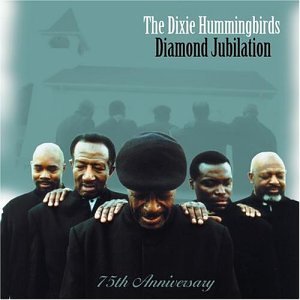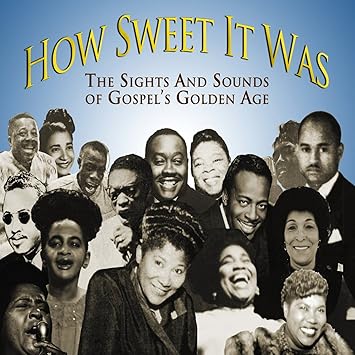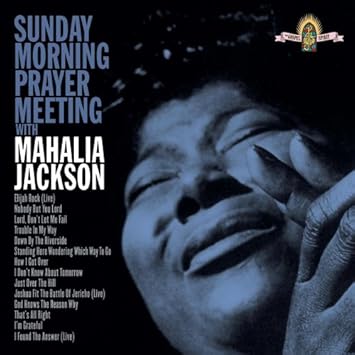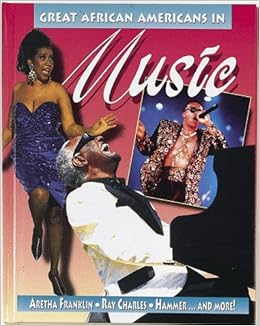
From Britannica Library Reference Center:
The tradition that came to be recognized as black American gospel music emerged in the late 19th and early 20th centuries alongside ragtime, blues, and jazz. The progenitors of the tradition, however, lie in both black and white musics of the 19th century, including, most notably, black spirituals, slave songs, and white hymnody.
The roots of black gospel music can be ultimately traced to the hymnals of the early 19th century. A Collection of Spiritual Songs and Hymns Selected from Various Authors (1801) was the first hymnal intended for use in black worship. It contained texts written mostly by 18th-century British clergymen, such as Isaac Watts and Charles Wesley, but also included a number of poems by black American Richard Allen—the founder of the African Methodist Episcopal Church—and his parishioners. The volume contained no music, however, leaving the congregation to sing the texts to well-known hymn tunes. After the Civil War, black hymnals began to include music, but most of the arrangements employed the rhythmically and melodically straightforward, unembellished style of white hymnody.
In the last decade of the 19th century, black hymnody experienced a stylistic shift. Colourful and allusive texts, reminiscent in many respects of the older black spirituals, were set to melodies composed by white hymnodists. The arrangements, however, were adjusted to reflect black American musical sensibilities. Most significantly, the hymns were syncopated; that is, they were recast rhythmically by accentuating normally weak beats. Among the first hymnals to use this modified musical style was The Harp of Zion, published in 1893 and readily adopted by many black congregations.
The immediate impetus for the development of this new, energetic, and distinctly black gospel music seems to have been the rise of Pentecostal churches at the end of the 19th century. Pentecostal shouting is related to speaking in tongues and to circle dances of African origin. Recordings of Pentecostal preachers’ sermons were immensely popular among black Americans in the 1920s, and recordings of them along with their choral and instrumental accompaniment and congregational participation persisted, so that ultimately black gospel reached the white audience as well. The voice of the black gospel preacher was affected by black secular performers and vice versa. Taking the scriptural direction “Let everything that breathes praise the Lord” (Psalm 150), Pentecostal churches welcomed tambourines, pianos, organs, banjos, guitars, other stringed instruments, and some brass into their services. Choirs often featured the extremes of female vocal range in call-and-response counterpoint with the preacher’s sermon. Improvised recitative passages, melismatic singing (singing of more than one pitch per syllable), and an extraordinarily expressive delivery also characterize black gospel music.
Among the most prominent black gospel music composers and practitioners have been the Rev. C.A. Tindley (1851–1933), composer of “I’ll Overcome Someday,” which may have served as the basis for the anthem of the American civil rights movement, “We Shall Overcome”; blind Reverend Gary Davis (1896–1972), a wandering preacher and guitar soloist; Thomas A. Dorsey (1899–1993), a prolific and best-selling songwriter whose works include, most notably, “Precious Lord, Take My Hand”; and the Reverend C.L. Franklin (1915–84) of Detroit (father of soul music singer Aretha Franklin), who issued more than 70 albums of his sermons and choir after World War II. Important women in the black gospel tradition have included Roberta Martin (1907–69), a gospel pianist based in Chicago with a choir and a school of gospel singing; Mahalia Jackson (1911–72), who toured internationally and was often broadcast on television and radio; and Sister Rosetta Tharpe (1915–73), whose guitar and vocal performances introduced gospel into nightclubs and concert theatres
 Dixie Hummingbirds: 75th Anniversary
Dixie Hummingbirds: 75th Anniversary How Sweet It Was (DVD)
How Sweet It Was (DVD) Odetta Holmes
Odetta Holmes Shout, Sister, Shout!: A Tribute to Sister Rosetta Tharp
Shout, Sister, Shout!: A Tribute to Sister Rosetta Tharp Sister Rosetta Tharp
Sister Rosetta Tharp Sunday Morning Prayer Meeting With Mahalia Jackson
Sunday Morning Prayer Meeting With Mahalia Jackson Thomas Dorsey (featured on Great African Americans in Music)
Thomas Dorsey (featured on Great African Americans in Music) WOW Gospel 2016
WOW Gospel 2016 Mighty Clouds of Joy
Mighty Clouds of Joy Still by
Still by